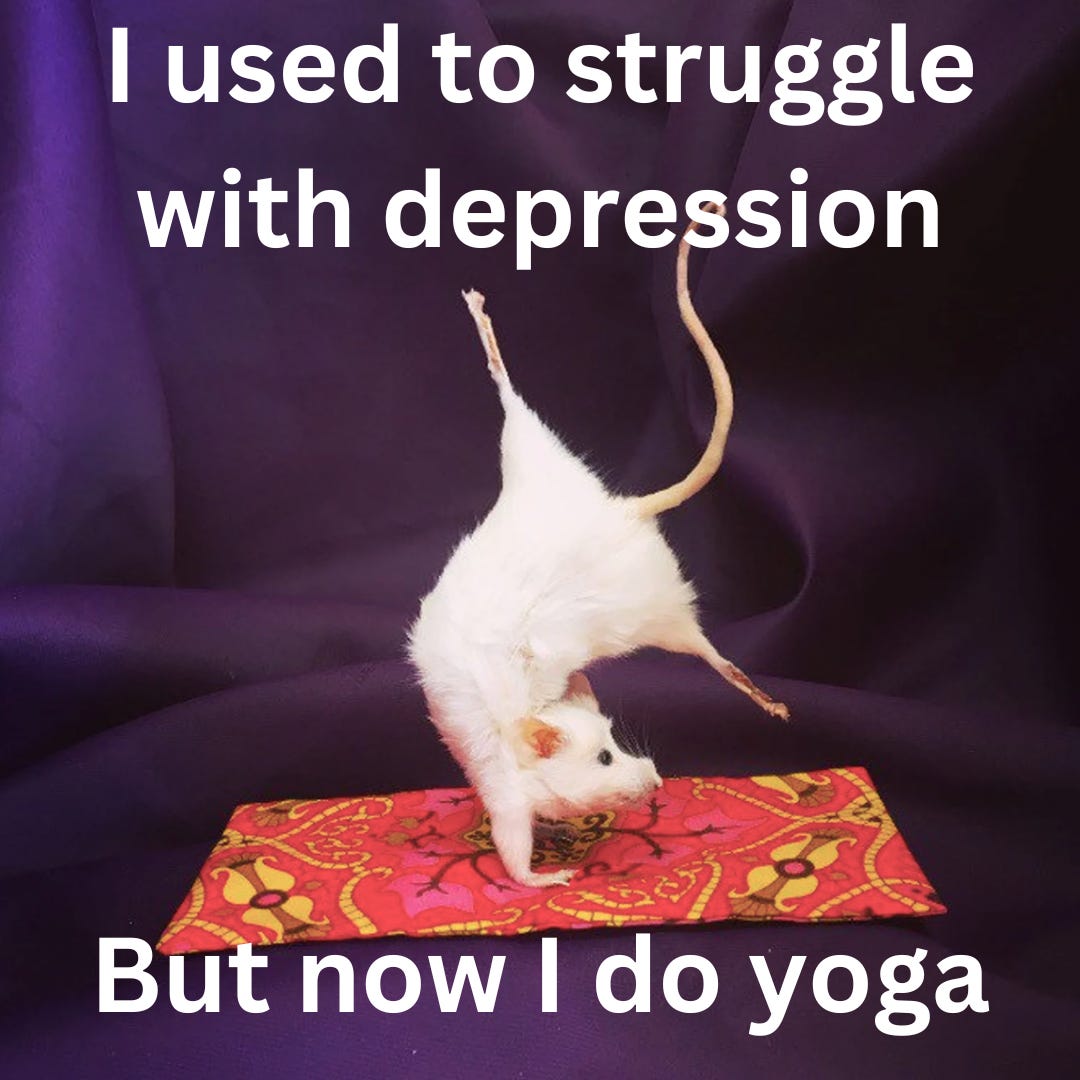Welcome to Of Mice & Mental Health, a newsletter demystifying and reimagining mental health for a calmer, more joyful life. And mice memes.
If you enjoy reading, please consider supporting my writing by subscribing for free, liking this post, donating, or sharing with friends.
The beginning of this post is an excerpt from my article first published on Slate.
One winter evening in early 2019, I relaxed on a blue sofa as about six people trickled into a dimly lit room for that night’s peer support meeting, which I was leading. After greeting each other and grabbing coffee or flavored seltzer, everyone joined the circle of comfy couches and chairs.
I began the session reflecting on how when we mention our suicidal thoughts, people often see us differently. “They typically ask a checklist of questions about plans to kill ourselves, even when that’s not our intention,” I said. “We’re often coerced into situations that make our lives worse, like being locked in the hospital, having belongings taken away, and being mandated to take drugs.”
Others interjected with stories of police being called on them, medication being altered without their consent, and being forced into sedation and restraints.
I reassured them nothing like that would happen here. The collective sigh of relief was audible.
Normalizing discussion of suicide is the key idea behind Alternatives to Suicide (Alt2Su), peer-led groups intended for adults who have suicidal thoughts or identify as survivors. It’s one of the only peer-to-peer support groups of its kind. Four years ago, I participated in a three-day training to become a facilitator, which involved engaging in debate, roleplay, and discussion, and leading practice sessions. I’ve both led and participated in groups ever since.
Co-founded in 2008 by Sera Davidow, director of the Wildflower Alliance in Massachusetts, Alt2Su has evolved and grown, with dozens of groups popping up around the U.S. and Australia. “We’re often the first place that asks, ‘Hey, did something happen before [these thoughts] started for you?’ ” Davidow said. Answers range widely, and often involve traumatic experiences such as abuse or loss.
Many suicide prevention efforts are based on false beliefs such as the chemical imbalance myth, which makes it harder to engage in a robust examination of the countless, complex reasons someone could be feeling the way they do. As Davidow explained, “When assumptions are present about what the cause is, curiosity disappears, and that inhibits the space to discuss, to explore, to make meaning of [our thoughts].”
Caroline Mazel-Carlton, director of training for the Wildflower Alliance and a group facilitator with a decade of experience, describes Alt2Su as a place where people ask, “How are you?” and actually tell the truth. “Just having that dialogue creates a human connection that’s real and authentic and that can help us stick around in the world,” she said.
There’s a persistent myth that it’s dangerous to talk about suicide. People fear saying the wrong thing or falsely assume talking will make someone more likely to act on their thoughts. What opening conversation actually does is “eliminate silence, shame, and social isolation,” Mazel-Carlton said, which has a huge positive impact on someone’s life and may reduce, rather than increase, suicidal thinking.
It’s common to hear that any mention of suicidal thoughts is a warning sign that someone should speak with a mental health professional—but professionals don’t have all the answers, either. According to the American Foundation for Suicide Prevention, there are no national guidelines that require education in how to treat someone with suicidal thoughts, either during certification or a career in mental health. Since many practitioners are trained to worry about liability, some people find they’re able to have more open, honest conversations with nonclinicians.
Continue reading on Slate, where this article was first published.
Next time I plan to write about the process of finding a new therapist and how challenging that’s been lately.
Three things that give me a reason to keep living:
Laughing so hard it feels like I can barely breath, especially if it’s about something silly that most people wouldn’t even find funny. When we made our way through the hallways in middle school, my childhood best friend and I used to pat our noses to imitate pushing a car horn and yell, “BEEP! BEEP!” at the younger students. (We were obnoxious.)
Listening to music that magically transports me to another time and place. When I hear Best Day of My Life by American Authors, I’m back at my wedding in 2014, performing our quirky first dance routine.
Sitting in my gorgeous backyard, where I am right now. While I’ve been typing this morning, I’ve seen blue jays, cardinals, bunnies, a fox, and a mouse too!
What are some reasons YOU keep living? I’d love to hear from you!
If you read this far, you deserve some cheese.









Very informative article! Fascinating (and horrifying) that there's no standard guidelines for educating clinicians on suicide. This Alternatives to Suicide group does sound better than speaking with a therapist though. Discussion is so important and I agree that liability concerns seem to take over when trying to speak with a mental health professional about it. I hope this peer-led group continues to pop up in more places!
I love the Alt2Su model, Marissa. You're doing IMPORTANT work in your life and your writing and even your memes (lol). Keep going.